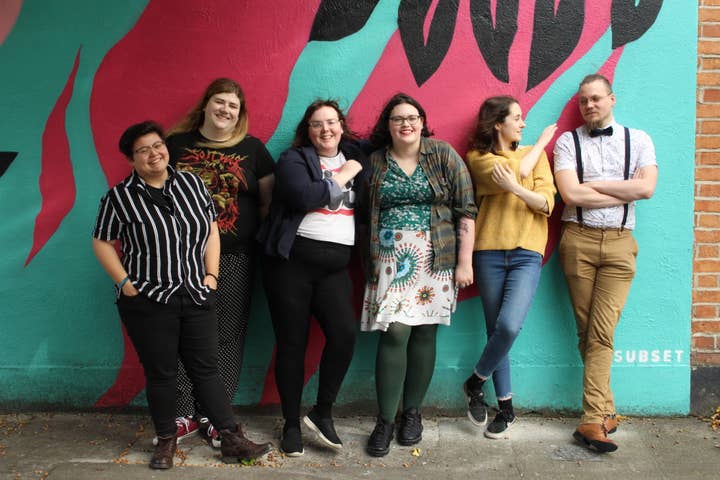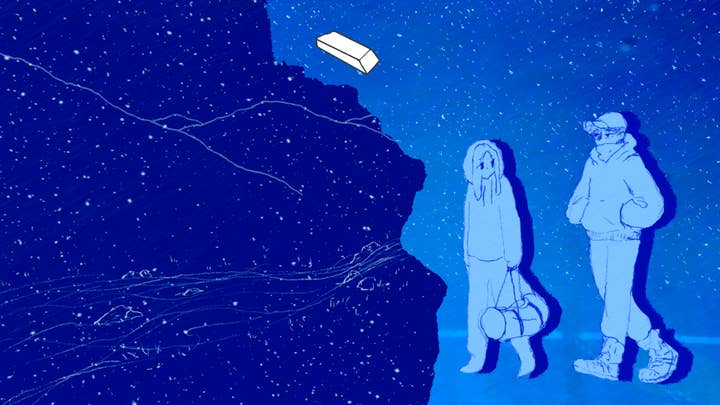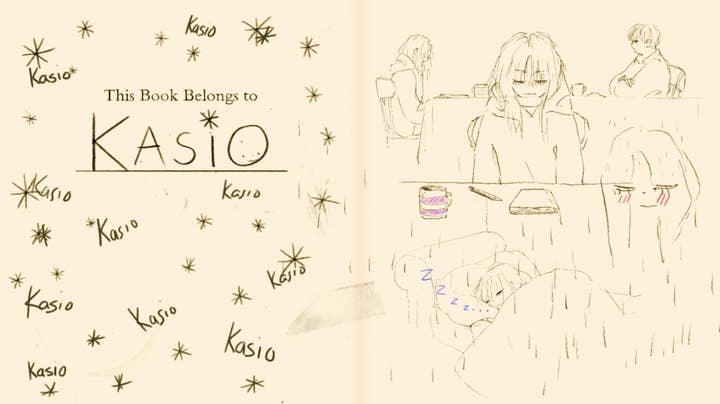If Found's celebration of experimental, queer game development tradition
Llaura McGee and Eve Golden-Woods share their thoughts on storytelling, representation, and design following a nomination at The Game Awards
When Llaura McGee and Eve Golden-Woods were making If Found, they -- along with the three other members of studio Dreamfeel -- wanted to make something "less gamey" than other games.
"It feels like there's a lot of unmapped territory in games," Golden-Woods says, speaking to GamesIndustry.biz. "There are certain fixed ways of doing games that people think of, and those can be super fun, and it's possible to do them really well. But the mechanics of interactivity are this enormous open space, right? There's just so much you can do. It's really fun to step off that track and into this wider space, you can do things that are really interesting and really exciting."
McGee originally started working on If Found alongside artist Liadh Young in 2015, with the two making small game concepts revolving around writing in diaries. One of these involved a witch's notebook where a spell could erase the text, which prompted experimentation with the idea of erasing a diary. The pair eventually nixed the witch and discovered the story of If Found -- in which main character Kasio explores past memories and connections from a critical time in her life, erasing as she goes.
"The mechanics of interactivity are this enormous open space, right? There's just so much you can do"
Eve Golden-Woods
The concept and execution won the demo of If Found several awards back in 2018, prompting Dreamfeel to pull together a team of five people to work on it full-time. McGee says that while she had historically worked on her projects solo, she had come to understand the need for other people's support, skills, and creativity to ultimately land on the kinds of projects she wanted to make.
"I love when games are made by individuals, because especially if it's made well you get a sense of that person," she says. "It's almost like music; everyone plays a guitar kind of differently. And then as you add in more people, it starts to get more unpredictable. But I think that as you add in loads and loads and loads more people, it's kind of like entropy. It becomes like noise, and if you have a big team you also have to take a big team on board with you -- which is the thing. So if you're trying to do something super experimental, it's hard enough to convince two people or three people. It's fundamentally more difficult to make an experimental game with a bigger team.
"I think the way that I would probably approach [development] is maybe more of a filmic approach. You have an alpha demo, then you bring everyone in to flesh out and do all the stuff, because then everyone's buying into the same idea rather than starting from scratch where everyone's taking their own ideas."
As both Golden-Woods and McGee have mentioned, the team's vision for If Found was specifically experimental, and specifically with regard to how the story is told. In our conversation, we discuss common video game storytelling conventions such as interrupting gameplay with cutscenes or using audio logs or written notes to give information about a game's world and characters, but both Golden-Woods and McGee indicate they think that's just one method of doing things -- a method that the games industry seems to be specifically stuck on.
"Capitalism drives video games so much, and studios have been making the same game for 15 years"
Llaura McGee
"There are many ways to tell a story with a game; [as many ways] as there are games," Golden-Woods says. "...Every part of a game is the storytelling. The music is the storytelling. The art is the storytelling. The mechanics are the storytelling. I often think that audio logs or cutscenes come from thinking of the story and the mechanics as separate. But they are all one thing."
McGee adds: "Twine is a really good example. People say, 'Oh, Twine, it's just like Choose Your Own Adventure.' But if you can think of all your favorite Twine games, I don't think it's the choices [that make them great] per se. Choices can give a certain experience. But what Twine gives you is interactivity, it gives you pacing, it gives you flavor. It's all part of the experience -- not just choice. And what are the interesting choices in Super Mario Bros.? It's the experience, the exhilaration of playing it.
"It's just kind of disappointing. For a long time, the people making the games in the '90s and early 2000s hadn't necessarily grown up playing games. Some of them played some things in the '80s, but there wasn't the same overwhelming culture of games. And now our culture of game makers are often people who've been playing the same kinds of games, and they're just making the same kinds of games to me. Whereas if you're making games in the 90s, maybe you played Pac-Man or something, but if you were working in 3D for the first time you got to come up with new ideas. But doing the same thing 30 years later is just kind of sad. There's so many other things you can do, it just takes a bit more creativity.

"Capitalism drives video games so much, and studios have been making the same game for 15 years. They might have had innovation in the 90s. What blew my mind recently is that it's seven years between Link to the Past and Ocarina of Time, and seven years ago, eight years ago, Call of Duty Black Ops 2 came out. The difference -- and there's just all these games that people aren't making, because they want to take that smaller risk and make things have a guaranteed return."
If Found's creative approach to storytelling has served it well -- landing it a Games for Impact nomination at The Game Awards, which honors titles with "a pro-social meaning or message." Specifically, If Found is an explicitly queer story, though McGee tells me she hadn't initially planned for the main character, Kasio, to be transgender.
"I would love to see more games just about gay people playing football, or trans people going to the beach, just all these other aspects of our lives"
Llaura McGee
"We started [If Found] and it wasn't a trans game," she says. "As we got to release, as we investigated the character more and her relationships with others, these were the things that came out to the front."
She adds that while If Found is a trans game, it doesn't feel to her like it's explicitly defined by being so. That said, she wants to see more games with better and more positive representation -- less focused on the pain of gay and transgender individuals, and more focused on their happy, average, everyday moments.
"We're not defined by [the sad] moments in our lives," she says. "I would love to see more games just about gay people playing football, or trans people going to the beach, just all these other aspects of our lives.
"The most important thing is that it is trans or gay people telling these stories. I think if someone else is telling the story, they'll be regurgitating the stories that they have heard. We're surrounded by stories of what it means to be trans or what it means to be gay, constantly. We're bombarded by them, and often these aren't coming from those people themselves. I think it's only through introspection that we can see what resonates or not, what is truthful or not. That's why it's important for trans people and gay people themselves to tell the stories because they can tell what's real and what's not."

McGee does believe these issues have improved over the last 30 years, and she feels gaming is better about issues of sexuality and gender than it is about questions of race and class -- she'd like to see the industry better its representation on those fronts as well.
With their nomination, both McGee and Golden-Woods are grateful for the recognition, with McGee seeing it as a sign among many that indie or "bedroom" games are making a return to mainstream interest after a high point in the '90s and early '00s. Golden-Woods adds that she hopes this brings mainstream attention not just to more indie games and more queer games, but specifically to the itch.io community where If Found first started.
"Llaura and I both come out of itch.io and that school of making games, which is small but wonderfully weird and vibrant and full of incredible people," she says. "I think it's really cool that If Found is a game from that tradition. We were lucky enough to get a publisher and get this bigger audience than most games like that get. So hopefully that's a doorway right that goes in both directions.
"Ideally, we get more publicity out of this and more eyes on our game, which would be lovely, but also more people use our game to then go to itch.io and start playing those weird, brilliant, experimental games. That would be the real dream, right? To be like, 'Look at all of this stuff you don't know about. Please go play.'"


